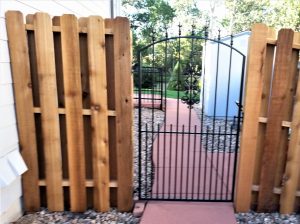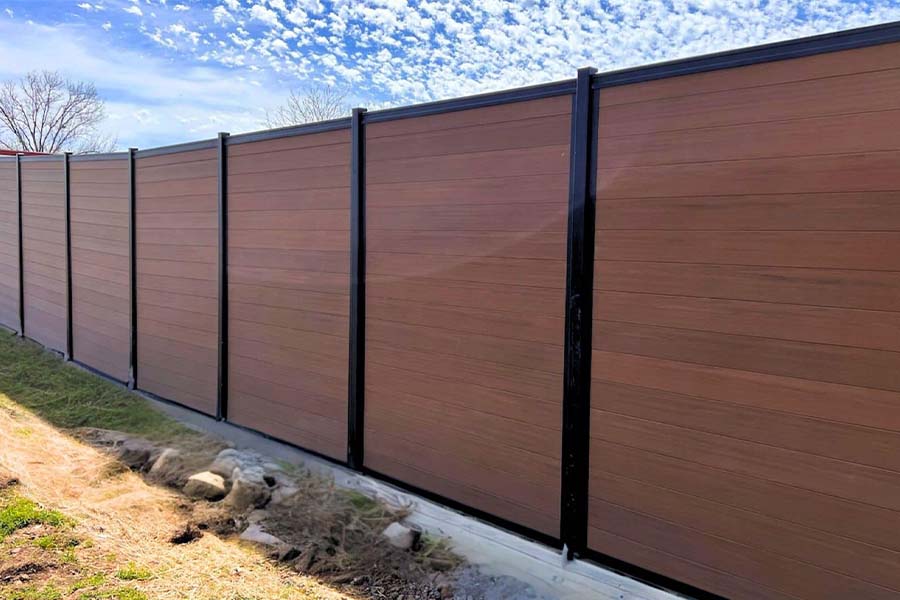All Categories
Featured
When thinking about fencing for your home, toughness is a top concern. Wrought iron is often selected for its remarkable longevity, yet exactly how does it compare to other common fence products, such as plastic, wood, and light weight aluminum?
Wrought Iron: The Strong and Dependable Selection. Wrought iron is among the most durable materials offered for secure fencing. Recognized for its phenomenal toughness, this steel can stand up to hefty impacts, strong winds, and extreme temperatures. Among the major benefits of functioned iron is its resistance to damage from bugs, rot, or weathering, which prevail problems with wood fencings. Unlike timber, functioned iron won't warp, fracture, or degeneration in time, making it an optimal choice for property owners who want a resilient, low-maintenance fence.
![]()
While functioned iron does call for some routine upkeep to prevent rust, it is usually simple to care for and can last for years if kept properly. A properly maintained functioned iron fencing can last 50 years or longer, providing long lasting value and defense for your building.
Timber Secure Fencing: A Standard however High-Maintenance Choice. Wood is vulnerable to several concerns that affect its longevity, consisting of rotting, warping, and termite damage. While a wood fence can last anywhere from 10 to 30 years depending on the kind of timber and maintenance, it requires regular upkeep, consisting of securing, discoloration, or painting to shield it from the elements.
Wood fences are likewise a lot more prone to physical damages, such as splintering or fracturing under pressure. If you're searching for a fence that is low-maintenance and can hold up against severe weather and damage, functioned iron is a much more long lasting alternative to timber.
Plastic Fence: Reduced Maintenance but Less Strength. Plastic fence is known for being low-maintenance and resistant to rot, fading, and staining. It is a popular choice to timber since it doesn't require routine painting or staining. While vinyl is resistant to numerous elements, it is not as strong as functioned iron. Plastic can crack or become weak in exceptionally chilly temperatures and may not have the ability to hold up against the influence of an accident or heavy winds in addition to functioned iron.
Vinyl fencing normally lasts between 20 and 30 years, and although it does not require as much maintenance as wood, it doesn't have the same durable toughness that wrought iron deals. Functioned iron is the a lot more trustworthy alternative. if longevity under extreme conditions is your top priority.
![]()
Aluminum Secure Fencing: A Lightweight and Durable Alternate. Aluminum fencing is a lighter alternative to functioned iron, using comparable benefits in regards to low maintenance and resistance to rust. Light weight aluminum won't warp, rust, or rot, and it can last 20 to thirty years or even more with marginal care. Nonetheless, light weight aluminum is not as solid as functioned iron and can be much more quickly damaged by influences, making it less ideal for high-security or high-traffic locations.
While light weight aluminum is more cost effective and much easier to set up than wrought iron, it does not supply the exact same level of durability or effect resistance. For those who desire a strong, resilient fencing that provides safety and security and durability, functioned iron stays the premium option.
Conclusion: Wrought Iron for Ultimate Longevity. In the fight for toughness, wrought iron continually outperforms other products like timber, aluminum, and plastic. Its capability to hold up against physical damage, harsh weather, and the test of time makes it among one of the most reputable fence choices offered. While timber requires significant upkeep, vinyl and light weight aluminum are not as strong as wrought iron and might not use the same lasting sturdiness.
For home owners seeking a fence that integrates toughness, protection, and timeless elegance, functioned iron is a superb financial investment. With proper treatment, a functioned iron fencing can last a lifetime, adding value and security to your residential property while boosting its overall visual appeal.
Wrought Iron: The Strong and Dependable Selection. Wrought iron is among the most durable materials offered for secure fencing. Recognized for its phenomenal toughness, this steel can stand up to hefty impacts, strong winds, and extreme temperatures. Among the major benefits of functioned iron is its resistance to damage from bugs, rot, or weathering, which prevail problems with wood fencings. Unlike timber, functioned iron won't warp, fracture, or degeneration in time, making it an optimal choice for property owners who want a resilient, low-maintenance fence.

While functioned iron does call for some routine upkeep to prevent rust, it is usually simple to care for and can last for years if kept properly. A properly maintained functioned iron fencing can last 50 years or longer, providing long lasting value and defense for your building.
Timber Secure Fencing: A Standard however High-Maintenance Choice. Wood is vulnerable to several concerns that affect its longevity, consisting of rotting, warping, and termite damage. While a wood fence can last anywhere from 10 to 30 years depending on the kind of timber and maintenance, it requires regular upkeep, consisting of securing, discoloration, or painting to shield it from the elements.
Wood fences are likewise a lot more prone to physical damages, such as splintering or fracturing under pressure. If you're searching for a fence that is low-maintenance and can hold up against severe weather and damage, functioned iron is a much more long lasting alternative to timber.
Plastic Fence: Reduced Maintenance but Less Strength. Plastic fence is known for being low-maintenance and resistant to rot, fading, and staining. It is a popular choice to timber since it doesn't require routine painting or staining. While vinyl is resistant to numerous elements, it is not as strong as functioned iron. Plastic can crack or become weak in exceptionally chilly temperatures and may not have the ability to hold up against the influence of an accident or heavy winds in addition to functioned iron.
Vinyl fencing normally lasts between 20 and 30 years, and although it does not require as much maintenance as wood, it doesn't have the same durable toughness that wrought iron deals. Functioned iron is the a lot more trustworthy alternative. if longevity under extreme conditions is your top priority.

Aluminum Secure Fencing: A Lightweight and Durable Alternate. Aluminum fencing is a lighter alternative to functioned iron, using comparable benefits in regards to low maintenance and resistance to rust. Light weight aluminum won't warp, rust, or rot, and it can last 20 to thirty years or even more with marginal care. Nonetheless, light weight aluminum is not as solid as functioned iron and can be much more quickly damaged by influences, making it less ideal for high-security or high-traffic locations.
While light weight aluminum is more cost effective and much easier to set up than wrought iron, it does not supply the exact same level of durability or effect resistance. For those who desire a strong, resilient fencing that provides safety and security and durability, functioned iron stays the premium option.
Conclusion: Wrought Iron for Ultimate Longevity. In the fight for toughness, wrought iron continually outperforms other products like timber, aluminum, and plastic. Its capability to hold up against physical damage, harsh weather, and the test of time makes it among one of the most reputable fence choices offered. While timber requires significant upkeep, vinyl and light weight aluminum are not as strong as wrought iron and might not use the same lasting sturdiness.
For home owners seeking a fence that integrates toughness, protection, and timeless elegance, functioned iron is a superb financial investment. With proper treatment, a functioned iron fencing can last a lifetime, adding value and security to your residential property while boosting its overall visual appeal.
Latest Posts
Trustworthy Overhead Door Solutions for Homes and Companies
Published en
1 min read
Selecting the Right Roof Covering Color: Effect on Energy Efficiency
Published en
1 min read
Uncover Montclare Auto Repair’s Leading Car Care Solutions and Why Drivers Trust Them
Published en
1 min read
More
Latest Posts
Trustworthy Overhead Door Solutions for Homes and Companies
Published May 25, 25
1 min read
Selecting the Right Roof Covering Color: Effect on Energy Efficiency
Published May 23, 25
1 min read
Uncover Montclare Auto Repair’s Leading Car Care Solutions and Why Drivers Trust Them
Published May 23, 25
1 min read